英文三十六计
三十六计英文版
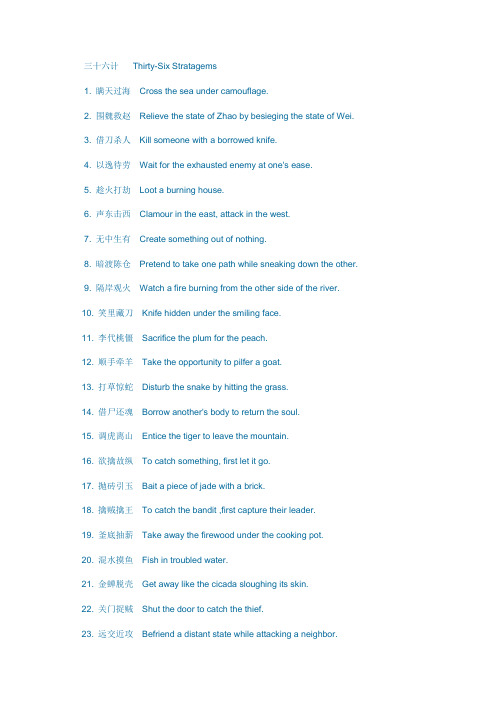
三十六计Thirty-Six Stratagems1. 瞒天过海Cross the sea under camouflage.2. 围魏救赵Relieve the state of Zhao by besieging the state of Wei.3. 借刀杀人Kill someone with a borrowed knife.4. 以逸待劳Wait for the exhausted enemy at one's ease.5. 趁火打劫Loot a burning house.6. 声东击西Clamour in the east, attack in the west.7. 无中生有Create something out of nothing.8. 暗渡陈仓Pretend to take one path while sneaking down the other.9. 隔岸观火Watch a fire burning from the other side of the river.10. 笑里藏刀Knife hidden under the smiling face.11. 李代桃僵Sacrifice the plum for the peach.12. 顺手牵羊Take the opportunity to pilfer a goat.13. 打草惊蛇Disturb the snake by hitting the grass.14. 借尸还魂Borrow another's body to return the soul.15. 调虎离山Entice the tiger to leave the mountain.16. 欲擒故纵To catch something, first let it go.17. 抛砖引玉Bait a piece of jade with a brick.18. 擒贼擒王To catch the bandit ,first capture their leader.19. 釜底抽薪Take away the firewood under the cooking pot.20. 混水摸鱼Fish in troubled water.21. 金蝉脱壳Get away like the cicada sloughing its skin.22. 关门捉贼Shut the door to catch the thief.23. 远交近攻Befriend a distant state while attacking a neighbor.24. 假途伐虢Obtain safe passage to conquer the enemy.25. 偷梁换柱Replace the beams with rotten timbers.26. 指桑骂槐Revile the locust tree while pointing at the mulberry.27. 假痴不癫Play dumb, remain smart.28. 上屋抽梯Pull down the ladder after ascent.29. 树上开花Deck the tree with bogus blossom.30. 反客为主Make the guest and host change places.31. 美人计The beauty trap; Use seductive women to corrupt the enemy.32. 空城计Present a bold front to conceal unpreparedness.33. 反间计Sow discord among the enemy; Use double agent.34. 苦肉计Inflict injury upon oneself to gain trust.35. 连环计Chain together the enemy's ships.36. 走为上Run away to fight another day; Escape is the best policy.。
三十六计原文译文及英文表达
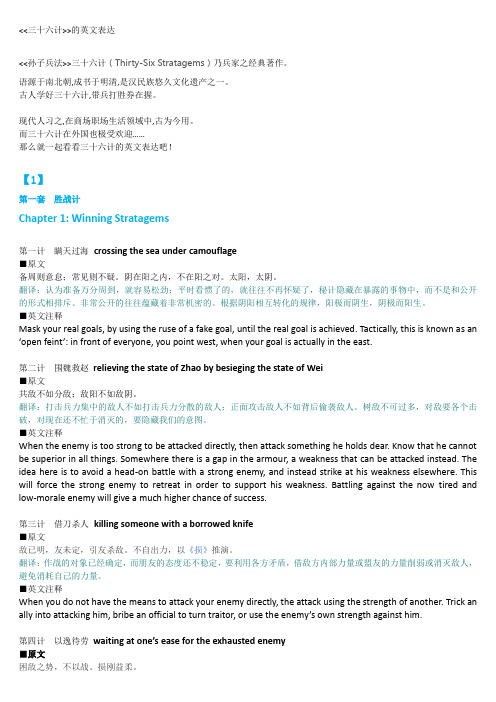
<<三十六计>>的英文表达<<孙子兵法>>三十六计(Thirty-Six Stratagems)乃兵家之经典著作。
语源于南北朝,成书于明清,是汉民族悠久文化遗产之一。
古人学好三十六计,带兵打胜券在握。
现代人习之,在商场职场生活领域中,古为今用。
而三十六计在外国也极受欢迎……那么就一起看看三十六计的英文表达吧!【1】第一套胜战计Chapter 1: Winning Stratagems第一计瞒天过海crossing the sea under camouflage■原文备周则意怠;常见则不疑。
阴在阳之内,不在阳之对。
太阳,太阴。
翻译:认为准备万分周到,就容易松劲;平时看惯了的,就往往不再怀疑了,秘计隐藏在暴露的事物中,而不是和公开的形式相排斥。
非常公开的往往蕴藏着非常机密的。
根据阴阳相互转化的规律,阳极而阴生,阴极而阳生。
■英文注释Mask your real goals, by using the ruse of a fake goal, until the real goal is achieved. Tactically, this is known as an ‘open feint’: in front of everyone, you point west, when your goal is actually in the east.第二计围魏救赵relieving the state of Zhao by besieging the state of Wei■原文共敌不如分敌;敌阳不如敌阴。
翻译:打击兵力集中的敌人不如打击兵力分散的敌人;正面攻击敌人不如背后偷袭敌人。
树敌不可过多,对敌要各个击破,对现在还不忙于消灭的,要隐藏我们的意图。
■英文注释When the enemy is too strong to be attacked directly, then attack something he holds dear. Know that he cannot be superior in all things. Somewhere there is a gap in the armour, a weakness that can be attacked instead. The idea here is to avoid a head-on battle with a strong enemy, and instead strike at his weakness elsewhere. This will force the strong enemy to retreat in order to support his weakness. Battling against the now tired and low-morale enemy will give a much higher chance of success.第三计借刀杀人killing someone with a borrowed knife■原文敌已明,友未定,引友杀敌。
36计英文详细翻译版——老外最喜欢看的孙子兵法
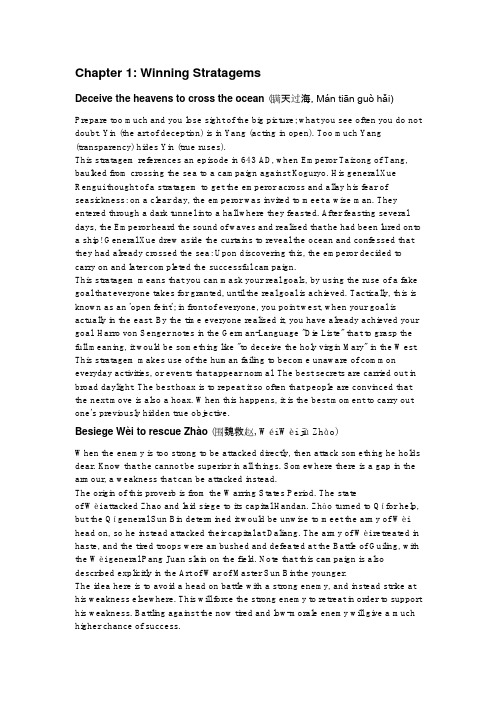
Chapter 1: Winning StratagemsDeceive the heavens to cross the ocean (瞒天过海, Mán tiān guò hǎi)Prepare too much and you lose sight of the big picture; what you see often you do not doubt. Yin (the art of deception) is in Yang (acting in open). Too much Yang (transparency) hides Yin (true ruses).This stratagem references an episode in 643 AD, when Emperor Taizong of Tang, baulked from crossing the sea to a campaign against Koguryo. His general Xue Rengui thought of a stratagem to get the emperor across and allay his fear of seasickness: on a clear day, the emperor was invited to meet a wise man. They entered through a dark tunnel into a hall where they feasted. After feasting several days, the Emperor heard the sound of waves and realised that he had been lured onto a ship! General Xue drew aside the curtains to reveal the ocean and confessed that they had already crossed the sea: Upon discovering this, the emperor decided to carry on and later completed the successful campaign.This stratagem means that you can mask your real goals, by using the ruse of a fake goal that everyone takes for granted, until the real goal is achieved. Tactically, this is known as an 'open feint'; in front of everyone, you point west, when your goal is actually in the east. By the time everyone realised it, you have already achieved your goal. Harro von Senger notes in the German-Language "Die Liste" that to grasp the full meaning, it would be something like "to deceive the holy virgin Mary" in the West. This stratagem makes use of the human failing to become unaware of common everyday activities, or events that appear normal. The best secrets are carried out in broad daylight. The best hoax is to repeat it so often that people are convinced that the next move is also a hoax. When this happens, it is the best moment to carry out one's previously hidden true objective.Besiege Wèi to rescue Zhào (围魏救赵, Wéi Wèi jiù Zhào)When the enemy is too strong to be attacked directly, then attack something he holds dear. Know that he cannot be superior in all things. Somewhere there is a gap in the armour, a weakness that can be attacked instead.The origin of this proverb is from the Warring States Period. The stateof Wèi attacked Zhao and laid siege to its capital Handan. Zhào turned to Qí for help, but the Qí general Sun Bin determined it would be unwise to meet the army of Wèi head on, so he instead attacked their capital at Daliang. The army of Wèi retreated in haste, and the tired troops were ambushed and defeated at the Battle of Guiling, with the Wèi general Pang Juan slain on the field. Note that this campaign is also described explicitly in the Art of War of Master Sun Binthe younger.The idea here is to avoid a head on battle with a strong enemy, and instead strike at his weakness elsewhere. This will force the strong enemy to retreat in order to support his weakness. Battling against the now tired and low-morale enemy will give a much higher chance of success.Kill with a borrowed knife (借刀杀人, Jiè dāo shā rén)Attack using the strength of another (in a situation where using one's own strength is not favourable). Trick an ally into attacking him, bribe an official to turn traitor, or use the enemy's own strength against him.The idea here is to cause damage to the enemy by getting a 3rd party to do the deed.Leisurely await for the laboured (以逸待劳, Yǐ yì dài láo)It is an advantage to choose the time and place for battle. In this way you know when and where the battle will take place, while your enemy does not. Encourage your enemy to expend his energy in futile quests while you conserve your strength. When he is exhausted and confused, you attack with energy and purpose.The idea is to have your troops well-prepared for battle, in the same time that the enemy is rushing to fight against you. This will give your troops a huge advantage in the upcoming battle, of which you will get to select the time and place.Loot a burning house (趁火打劫, Chèn huǒ dǎ jié)When a country is beset by internal conflicts, when disease and famine ravage the population, when corruption and crime are rampant, then it will be unable to deal with an outside threat. This is the time to attack.Keep gathering internal information about an enemy. If the enemy is currently in its weakest state ever, attack it without mercy and totally destroy it to prevent future troubles.Make a sound in the east, then strike in the west (声东击西, Shēng dōng jí xī)In any battle the element of surprise can provide an overwhelming advantage. Even when face to face with an enemy, surprise can still be employed by attacking where he least expects it. To do this you must create an expectation in the enemy's mind through the use of a feint.The idea here is to get the enemy to focus his forces in a location, and then attack elsewhere which would be weakly defended.Chapter 2: Enemy Dealing StratagemsCreate something from nothing (無中生有/无中生有, Wú zhōng shēngyǒu)A plain lie. Make somebody believe there was something when there is in fact nothing.One method of using this stratagem is to create an illusion of something's existence, while it does not exist. Another method is to create an illusion that something does not exist, while it does.Openly repair the gallery roads, but sneak through the passageof Chencang (暗渡陈仓, Àn dù chén cāng)Deceive the enemy with an obvious approach that will take a very long time, while surprising him by taking a shortcut and sneak up to him. As the enemy concentrates on the decoy, he will miss you sneaking up to him.The phrase originated from the Chu-Han contention, where Liu Bang retreated to the lands of Sichuan to prepare for a confrontation withXiang Yu. Once he was fully prepared, Liu Bang sent men to openly repair the gallery roads he had destroyed earlier, while secretly moving his troops towards Guanzhong through the small town of Chencang instead. When Xiang Yu received news of Liu Bang repairing the gallery roads, he dismissed the threat since he knew the repairs would take years to complete. This allowed Liu Bang to retake Guanzhong by surprise, and eventually led to his victory over Xiang Yu and the birth of the Han Dynasty.This tactic is an extension of the "Make a sound in the east, then strike in the west" tactic. But instead of simply spreading misinformation to draw the enemy's attention, physical baits are used to increase the enemy's certainty on the misinformation. These baits must be easily seen by the enemy, to ensure that they draw the enemy's attention. At the same time, the baits must act as if what they meant to do what they were falsely doing, to avoid drawing the enemy's suspicion.Watch the fires burning across the river (隔岸观火, Gé àn guān huǒ)Delay entering the field of battle until all the other players have become exhausted fighting amongst themselves. Then go in at full strength and pick up the pieces.Hide a knife behind a smile (笑里藏刀, Xiào lǐ cáng dāo)Charm and ingratiate yourself to your enemy. When you have gained his trust, move against him in secret.Sacrifice the plum tree to preserve the peach tree (李代桃僵, Lǐ dài táojiāng)There are circumstances in which you must sacrifice short-term objectives in order to gain the long-term goal. This is the scapegoat stratagem whereby someone else suffers the consequences so that the rest do not.Take the opportunity to pilfer a goat (顺手牵羊, Shùn shǒu qiān yáng)While carrying out your plans be flexible enough to take advantage of any opportunity that presents itself, however small, and avail yourself of any profit, however slight. [edit]Chapter 3: Attacking StratagemsStomp the grass to scare the snake (打草惊蛇, Dá cǎo jīng shé)Do something unaimed, but spectacular ("hitting the grass") to provoke a response of the enemy ("startle the snake"), thereby giving away his plans or position, or just taunt him. Do something unusual, strange, and unexpected as this will arouse the enemy's suspicion and disrupt his thinking. More widely used as "[Do not] startle the snake by hitting the grass". An imprudent act will give your position or intentions away to the enemy.Borrow a corpse to resurrect the soul (借尸还魂, Jiè shī huán hún)Take an institution, a technology, a method, or even an ideology that has been forgotten or discarded and appropriate it for your own purpose. Revive something from the past by giving it a new purpose or bring to life old ideas, customs, or traditions and reinterpret them to fit your purposes.Entice the tiger to leave its mountain lair (调虎离山, Diào hǔ lí shān)Never directly attack an opponent whose advantage is derived from its position. Instead lure him away from his position thus separating him from his source of strength.In order to capture, one must let loose (欲擒故纵, Yù qín gū zòng)Cornered prey will often mount a final desperate attack. To prevent this you let the enemy believe he still has a chance for freedom. His will to fight is thus dampened by his desire to escape. When in the end the freedom is proven a falsehood the enemy's morale will be defeated and he will surrender without a fight.Tossing out a brick to get a jade gem (抛砖引玉, Pāo zhuān yǐn yù)Bait someone by making him believe he gains something or just make him react to it ("toss out a brick") and obtain something valuable from him in return ("get a jade gem").This proverb is based on a story involving two famous poets of the Tang Dynasty. There was a great poet named Zhao Gu and another lesser poet by the nameof Chang Jian . While Chang Jian was travelling in Suzhou, he heard news that Zhao Gu would be visiting a temple in the area. Chang Jian wished to learn from the masterpoet, so he devised a plan and went to the temple in advance, then wrote a poem on the temple walls with only two of the four lines completed, hoping Zhao Gu would see it and finish the poem. Zhao Gu acted as Chang Jian foresaw, and from this story came the proverb.Defeat the enemy by capturing their chief (擒贼擒王, Qín zéi qín wáng)If the enemy's army is strong but is allied to the commander only by money, superstition or threats, then take aim at the leader. If the commander falls the rest of the army will disperse or come over to your side. If, however, they are allied to the leader through loyalty then beware, the army can continue to fight on after his death out of vengeance.Chapter 4: Chaos StratagemsRemove the firewood from under the pot (釜底抽薪, Fǔ dǐ chōu xīn)If something must be destroyed, destroy the source.Catch a fish while the water is disturbed (混水摸鱼, Hún shuǐ mō yú)Create confusion and use this confusion to further your own goals.Slough off the cicada's golden shell (金蝉脱壳, Jīn chán tuō qiào)It's a stratagem mainly used to escape from enemy of a more superior force. One use this stratagem by slough off one's shell, which tricked the enemy to believe to have grasped one's essential. Mask yourself. Either leave flamboyant traits behind, thus going incognito; or just masquerade yourself and create an illusion to fit your goals and distract others.Shut the door to catch the thief (关门捉贼, Guān mén zhōu zéi)To capture your enemy, or more generally in fighting wars, to deliver the final blow to your enemy, you must plan prudently if you want to succeed. Do not rush into action. Before you "move in for the kill", first cut off your enemy's escape routes, and cut off any routes through which outside help can reach them.Befriend a distant state while attacking a neighbour (远交近攻, Yuǎn jiāo jìn gōng)It is known that nations that border each other become enemies while nations separated by distance and obstacles make better allies. When you are the strongestin one field, your greatest threat is from the second strongest in your field, not the strongest from another field. This policy is associated with Fan Sui of Qin, circa 269 BC.Obtain safe passage to conquer the State of Guo (假道伐虢, Jiǎ dào fá Guó)Borrow the resources of an ally to attack a common enemy. Once the enemy is defeated, use those resources to turn on the ally that lent you them in the first place. See Duke Xian of Jin.Chapter 5: Proximate StratagemsReplace the beams with rotten timbers (偷梁换柱, Tōu liáng huàn zhù)Disrupt the enemy's formations, interfere with their methods of operations, change the rules in which they are used to follow, go contrary to their standard training. In this way you remove the supporting pillar, the common link that makes a group of men an effective fighting force.Point at the mulberry tree while cursing the locust tree (指桑骂槐, Zhǐsāng mà huái)To discipline, control, or warn others whose status or position excludes them from direct confrontation; use analogy and innuendo. Without directly naming names, those accused cannot retaliate without revealing their complicity.Feign madness but keep your balance (假痴不癫, Jiǎ chī bù diān)Hide behind the mask of a fool, a drunk, or a madman to create confusion about your intentions and motivations. Lure your opponent into underestimating your ability until, overconfident, he drops his guard. Then you may attack.Remove the ladder when the enemy has ascended to the roof (上屋抽梯, Shàng wū chōu tī)With baits and deceptions, lure your enemy into treacherous terrain. Then cut off his lines of communication and avenue of escape. To save himself, he must fight both your own forces and the elements of nature.Deck the tree with false blossoms (树上开花, Shù shàng kāi huā)Tying silk blossoms on a dead tree gives the illusion that the tree is healthy. Through the use of artifice and disguise, make something of no value appear valuable; of nothreat appear dangerous; of no use appear useful. This is the same stratagemas Potemkin villages.Make the host and the guest exchange roles (反客为主, Fǎn kè wéi zhǔ)Usurp leadership in a situation where you are normally subordinate. Infiltrate your target. Initially, pretend to be a guest to be accepted, but develop from inside and become the owner later.Chapter 6: Defeat StratagemsThe beauty trap (honey trap) (美人计, Měi rén jì)Send your enemy beautiful women to cause discord within his camp. This stratagem can work on three levels. First, the ruler becomes so enamoured with the beauty that he neglects his duties and allows his vigilance to wane. Second, other males at court will begin to display aggressive behaviour that inflames minor differences hindering co-operation and destroying morale. Third, other females at court, motivated by jealousy and envy, begin to plot intrigues further exacerbating the situation.The empty fort strategy (空城计, Kōng chéng jì)When the enemy is superior in numbers and your situation is such that you expect to be overrun at any moment, then drop all presence of military preparedness, act calmly and appear disrespect of the enemy, so that the enemy will think you have hidden huge power and you want to trap them into the fort with your calm and easiness. This has to be used when in most of the cases, you do have huge power hidden under the disguise and you only play the real empty rarely. This depends on having a clever opponent who, in perceiving a trap, may over-think their reaction[4].Let the enemy's own spy sow discord in the enemy camp (反间计, Fǎnjiàn jì)Undermine your enemy's ability to fight by secretly causing discord between him and his friends, allies, advisors, family, commanders, soldiers, and population. While he is preoccupied settling internal disputes, his ability to attack or defend, is compromised.Inflict injury on oneself to win the enemy's trust (苦肉计, Kǔ ròu jì)Pretending to be injured has two possible applications. In the first, the enemy is lulled into relaxing his guard since he no longer considers you to be an immediate threat. The second is a way of ingratiating yourself to your enemy by pretending the injury was caused by a mutual enemy.Chain stratagems (连环计, Lián huán jì)In important matters, one should use several stratagems applied simultaneously after another as in a chain of stratagems. Keep different plans operating in an overall scheme; however, in this manner if any one stratagem fails, then the chain breaks and the whole scheme fails.If everything else fails, retreat (走为上, Zǒu wéi shàng)If it becomes obvious that your current course of action will lead to defeat, then retreat and regroup. When your side is losing, there are only three choices remaining: surrender, compromise, or escape. Surrender is complete defeat, compromise is half defeat, but escape is not defeat. As long as you are not defeated, you still have a chance.。
孙子兵法与36计(中英文对照) PPT

第三计 借刀杀人 killing someone with a borrowed knife
• 敌已明,友示定,引友杀敌,不自出力,以《损》 推演。 • When you do not have the means to attack your enemy directly, then attack using the strength of another.
第二套 敌战计 Chapter 2: Enemy Dealing Stratagems
• 第七计 无中生有 • creating something out of nothing • 诳也,非诳也,实其所诳也。少阴,太阴,太阳。 • You use the same feint twice. Having reacted to the first and often the second feint as well, the enemy will be hesitant to react to a third feint. Therefore the third feint is the actual attack catching your enemy with his guard down.
第八计 暗渡陈仓 advancing secretly by an unknown path • Deceive the enemy with an obvious approach that will take a very long time, while surprising him by taking a shortcut and sneak up to him. As the enemy concentrates on the decoy, he will miss you sneaking up to him.
三十六计 (sān shí liù jì)—中国历史著述英文版

三十六计(sān shíliùjì)Thirty-Six StratagemsAncient ruses can still be usefulAlmost all Chinese speakers know the famous “Thirty-Six Stratagems”and many apply thesestrategies or practical ruses in warfare, politics, business, gaming and even daily life. But no oneknows for sure when the book was written and who was the author.Many historians and scholars believe that the term “thirty-six stratagems”was first used in thebiography of Tan Daoji (?-436 AD), a renowned general of the State of Song (420-479 AD) duringthe Southern Dynasty (420-589 AD) and that the book was compiled during the Ming Dynasty(1368-1644).The book is divided into six chapters: Winning Stratagems, Enemy Dealing Stratagems, AttackingStratagems, Chaos Stratagems, Proximate Stratagems and Desperate Stratagems, with eachchapter containing six practical ploys.In the first chapter, the author recommends six stratagems, such as killing with a borrowed knife,waiting at ease for a worn-out enemy, looting a house when it's on fire and makinga feint to theeast, but hitting out in the west.The stratagem of killing with a borrowed knife sounds like a ploy to cover one's tracks in order tomislead hunters looking for the real perpetrator. However, the true meaning of this stratagem isto attack your enemy by using the forces or strength of a third party, or to entice your ally intoattacking your enemy instead of doing it yourself.Meanwhile, the stratagem of looting a house when it's on fire means to take advantage of thechaos when someone's house is on fire to steal the valuables. When it is applied in war and othercircumstances, it takes on a much broader meaning. According to this scheme, you should try to annex territory when your enemy's country issuffering from internal turmoil. You should take its people when it is being invaded by otherforces. Finally, when the enemy's country is beset with both internal and external crises, youshould mercilessly attack and destroy it.In the second chapter, the most eye-catching stratagem is hiding a dagger behind a smile. Smilesare usually friendly, charming and disarming as well. So, it could also be deadly if someonefollows this scheme and hides a lethal weapon behind a smile.To defeat your enemy with a fatal strike, you need to get very close, and smiles could help youget there. Charming and ingratiating smiles can relax your enemy's vigilance if not even win hisfull trust. When your enemy is fooled enough by your smile to let you get close to him, youproduce the hidden weapon and slay him in a surprise attack.Another popular stratagem is contained in the fourth chapter,namely, fishing in turbid waters.This ruse means literally muddying the water so the fish will get disoriented and become easierto catch.In a chaotic and confusing situation, this ploy could help to win over uncommitted forcesinvolved in the conflict.When an army is in panic, officers and soldiers will become disconcerted and divided. They lookat each other in an attempt to sense the thought behind the face; they wink to someone orwhisper into the ear of the one next to them. They begin to believe in rumors and disobey orignore orders. This is an indication of confusion and fear. But this is also the optimal time to persuade them tobecome an ally and to further press your advantage.The last stratagem provided by the author in the last chapter of the book advises people toretreat when everything fails.In face of an overwhelmingly powerful enemy and seeing no chance to win the battle, to retreatis usually the best choice. Surrender may represent a complete defeat; a compromise may mean a partial defeat; but toretreat is no defeat. As long as you are not defeated, you still retain a chance for victory inthefuture. This is the so-called “retreat-in-order-to-advance”principle.。
孙子兵法与36计(中英文对照)
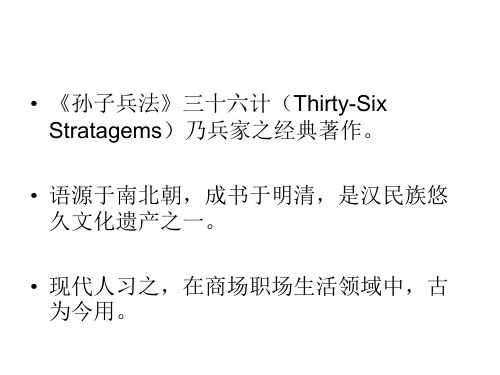
第十七计 抛砖引玉 giving the enemy something to induce him to lose more valuable things
• Bait someone by making him believe he gains something or just make him react to it ("toss out a brick") and obtain something valuable from him in return ("get a jade gem").
第二套 敌战计 Chapter 2: Enemy Dealing Stratagems
• 第七计 无中生有 • creating something out of nothing • 诳也,非诳也,实其所诳也。少阴,太阴,太阳。 • You use the same feint twice. Having reacted to the first and often the second feint as well, the enemy will be hesitant to react to a third feint. Therefore the third feint is the actual attack catching your enemy with his guard down.
第十六计 欲擒故纵 letting the enemy off in order to catch him
• Cornered prey will often mount a final desperate attack. To prevent this you let the enemy believe he still has a chance for freedom.
《三十六计》中英文对照

《三十六计》中英文对照《孙子兵法》三十六计(Thirty-Six Stratagems)乃兵家之经典著作。
语源于南北朝,成书于明清,是汉民族悠久文化遗产之一。
古人学好三十六计,带兵打胜券在握。
现代人习之,在商场职场生活领域中,古为今用。
而三十六计在外国也极受欢迎,今天就来学习下《三十六计》的中英文表达吧!第一套胜战计Winning Stratagems第一计瞒天过海crossing the sea under camouflage备周则意怠;常见则不疑。
阴在阳之内,不在阳之对。
太阳,太阴。
Mask your real goals, by using the ruse of a fake goal, until the real goal is achieved. Tactically, this is known as an 'open feint': in front of everyone, you point west, when your goal is actually in the east.第二计围魏救赵relieving the state of Zhao by besieging the state of Wei共敌不如分敌;敌阳不如敌阴。
When the enemy is too strong to be attacked directly, then attack something he holds dear. Know that he cannot be superior in all things. Somewhere there is a gap in the armour, a weakness that can be attacked instead.页脚内容1The idea here is to avoid a head-on battle with a strong enemy, and instead strike at his weakness elsewhere. This will force the strong enemy to retreat in order to support his weakness. Battling against the now tired and low-morale enemy will give a much higher chance of success.第三计借刀杀人killing someone with a borrowed knife敌已明,友示定,引友杀敌,不自出力,以《损》推演。
美人计-三十六计英文表达
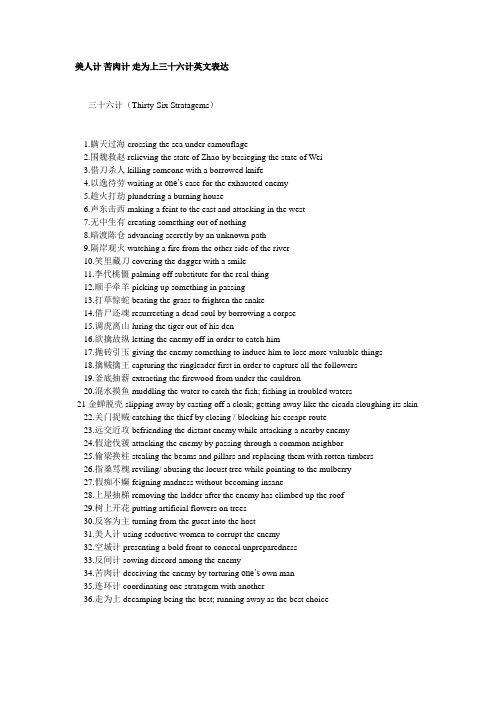
美人计苦肉计走为上三十六计英文表达三十六计(Thirty-Six Stratagems)1.瞒天过海crossing the sea under camouflage2.围魏救赵relieving the state of Zhao by besieging the state of Wei3.借刀杀人killing someone with a borrowed knife4.以逸待劳waiting at one’s ease for the exhausted enemy5.趁火打劫plundering a burning house6.声东击西making a feint to the east and attacking in the west7.无中生有creating something out of nothing8.暗渡陈仓advancing secretly by an unknown path9.隔岸观火watching a fire from the other side of the river10.笑里藏刀covering the dagger with a smile11.李代桃僵palming off substitute for the real thing12.顺手牵羊picking up something in passing13.打草惊蛇beating the grass to frighten the snake14.借尸还魂resurrecting a dead soul by borrowing a corpse15.调虎离山luring the tiger out of his den16.欲擒故纵letting the enemy off in order to catch him17.抛砖引玉giving the enemy something to induce him to lose more valuable things18.擒贼擒王capturing the ringleader first in order to capture all the followers19.釜底抽薪extracting the firewood from under the cauldron20.混水摸鱼muddling the water to catch the fish; fishing in troubled waters21金蝉脱壳slipping away by casting off a cloak; getting away like the cicada sloughing its skin22.关门捉贼catching the thief by closing / blocking his escape route23.远交近攻befriending the distant enemy while attacking a nearby enemy24.假途伐虢attacking the enemy by passing through a common neighbor25.偷梁换柱stealing the beams and pillars and replacing them with rotten timbers26.指桑骂槐reviling/ abusing the locust tree while pointing to the mulberry27.假痴不癫feigning madness without becoming insane28.上屋抽梯removing the ladder after the enemy has climbed up the roof29.树上开花putting artificial flowers on trees30.反客为主turning from the guest into the host31.美人计using seductive women to corrupt the enemy32.空城计presenting a bold front to conceal unpreparedness33.反间计sowing discord among the enemy34.苦肉计deceiving the enemy by torturing one’s own man35.连环计coordinating one stratagem with another36.走为上decamping being the best; running away as the best choice。
英文版《三十六计》,快来围观!

英文版《三十六计》,快来围观!三十六计(Thirty-Six Stratagems)乃兵家之经典著作,也是古今中外必读之作。
01、Winning Stratagems第一套胜战计第一计瞒天过海Crossing the sea under camouflage备周则意怠;常见则不疑。
阴在阳之内,不在阳之对。
太阳,太阴。
Mask your real goals, by using the ruse of a fake goal, until the real goal is achieved. Tactically, this is known as an 'open feint': in front of everyone, you point west, when your goal is actually in the east.第二计围魏救赵Relieving the state of Zhao by besieging the state of Wei共敌不如分敌;敌阳不如敌阴。
When the enemy is too strong to be attacked directly, then attack something he holds dear. Know that he cannot be superior in all things. Somewhere there is a gap in the armour, a weakness that can be attacked instead.The idea here is to avoid a head-on battle with a strong enemy, and instead strike at his weakness elsewhere. This will force the strong enemy to retreat in order to support his weakness. Battling against the now tired and low-morale enemy will give a much higher chance of success.第三计借刀杀人Killing someone with a borrowed knife敌已明,友示定,引友杀敌,不自出力,以《损》推演。
优品课件之三十六计(Thirty-Six Stratagems)中英文翻译
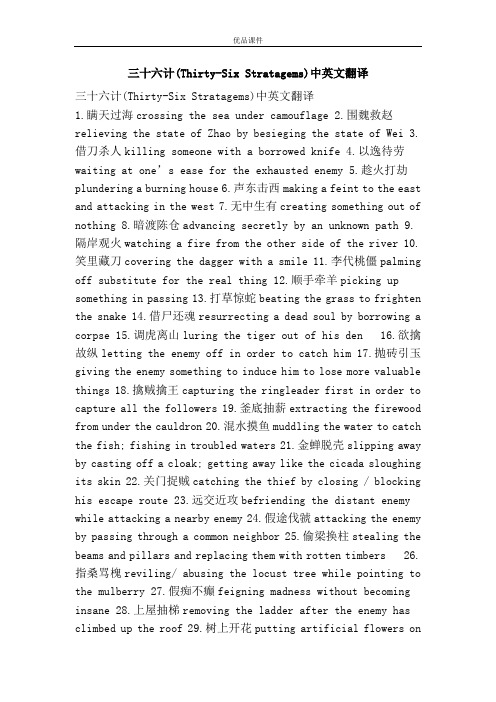
三十六计(Thirty-Six Stratagems)中英文翻译三十六计(Thirty-Six Stratagems)中英文翻译1.瞒天过海crossing the sea under camouflage2.围魏救赵relieving the state of Zhao by besieging the state of Wei3.借刀杀人killing someone with a borrowed knife4.以逸待劳waiting at one’s ease for the exhausted enemy5.趁火打劫plundering a burning house6.声东击西making a feint to the east and attacking in the west7.无中生有creating something out of nothing8.暗渡陈仓advancing secretly by an unknown path9.隔岸观火watching a fire from the other side of the river 10.笑里藏刀covering the dagger with a smile 11.李代桃僵palming off substitute for the real thing 12.顺手牵羊picking up something in passing 13.打草惊蛇beating the grass to frighten the snake 14.借尸还魂resurrecting a dead soul by borrowing a corpse 15.调虎离山luring the tiger out of his den 16.欲擒故纵letting the enemy off in order to catch him 17.抛砖引玉giving the enemy something to induce him to lose more valuable things 18.擒贼擒王capturing the ringleader first in order to capture all the followers 19.釜底抽薪extracting the firewood from under the cauldron 20.混水摸鱼muddling the water to catch the fish; fishing in troubled waters 21.金蝉脱壳slipping away by casting off a cloak; getting away like the cicada sloughing its skin 22.关门捉贼catching the thief by closing / blocking his escape route 23.远交近攻befriending the distant enemy while attacking a nearby enemy 24.假途伐虢attacking the enemy by passing through a common neighbor 25.偷梁换柱stealing the beams and pillars and replacing them with rotten timbers 26.指桑骂槐reviling/ abusing the locust tree while pointing to the mulberry 27.假痴不癫feigning madness without becoming insane 28.上屋抽梯removing the ladder after the enemy has climbed up the roof 29.树上开花putting artificial flowers ontrees 30.反客为主turning from the guest into the host 31.美人计using seductive women to corrupt the enemy 32.空城计presenting a bold front to conceal unpreparedness 33.反间计sowing discord among the enemy 34.苦肉计deceiving the enemy by torturing one’s own man 35.连环计coordinating one stratagem with another 36.走为上decamping being the best; running away as the best choice优品课件,意犹未尽,知识共享,共创未来!!!。
36计谋 英文介绍

36计谋英文介绍The "36 Stratagems" is a Chinese essay used toillustrate a series of stratagems used in politics, war, and business. Each proverbial expression represents a stratagem used in ancient China and is still widely used in Chinese culture and business. The 36 stratagems are notjust about military tactics, but also about deception, cunning, and diplomacy. They are often used as a guide for handling conflicts and achieving success in various situations.In English, the "36 Stratagems" can be translated as the "36 Strategies." Each strategy is a succinct and pithy saying that encapsulates a particular tactic or approach to achieving one's goals. Some of the stratagems include "Deceive the heavens to cross the ocean," "Besiege Wei to rescue Zhao," and "Kill with a borrowed knife." These strategies are often used as a source of inspiration and guidance in the fields of business, negotiation, and conflict resolution.The "36 Stratagems" have been studied and analyzed by scholars and strategists around the world. They have been applied in various contexts, such as military operations, corporate management, and even in everyday social interactions. The timeless wisdom contained in these stratagems continues to be relevant in contemporary society, making them a valuable resource for those seeking to navigate complex and challenging situations.In conclusion, the "36 Stratagems" is a collection of ancient Chinese wisdom that offers insights into the art of strategy and tactics. Its principles have been influentialin both Eastern and Western cultures and continue to be studied and applied in modern times.。
36计英文翻译
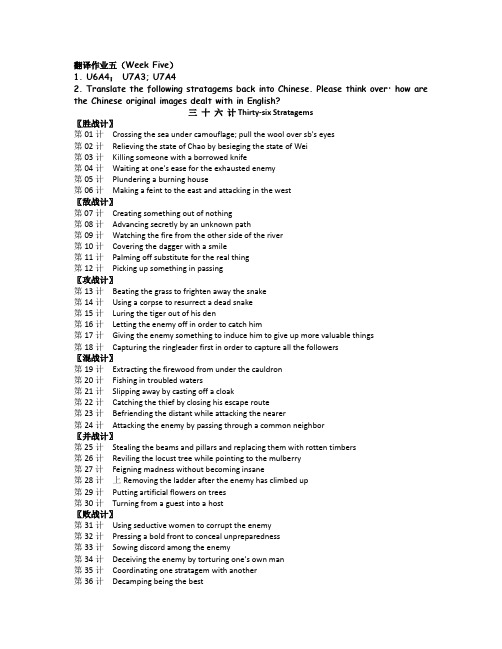
翻译作业五(Week Five)1. U6A4; U7A3; U7A42. Translate the following stratagems back into Chinese. Please think over: how are the Chinese original images dealt with in English?三十六计Thirty-six Stratagems〖胜战计〗第01计Crossing the sea under camouflage; pull the wool over sb's eyes第02计Relieving the state of Chao by besieging the state of Wei第03计Killing someone with a borrowed knife第04计Waiting at one's ease for the exhausted enemy第05计Plundering a burning house第06计Making a feint to the east and attacking in the west〖敌战计〗第07计Creating something out of nothing第08计Advancing secretly by an unknown path第09计Watching the fire from the other side of the river第10计Covering the dagger with a smile第11计Palming off substitute for the real thing第12计Picking up something in passing〖攻战计〗第13计Beating the grass to frighten away the snake第14计Using a corpse to resurrect a dead snake第15计Luring the tiger out of his den第16计Letting the enemy off in order to catch him第17计Giving the enemy something to induce him to give up more valuable things第18计Capturing the ringleader first in order to capture all the followers〖混战计〗第19计Extracting the firewood from under the cauldron第20计Fishing in troubled waters第21计Slipping away by casting off a cloak第22计Catching the thief by closing his escape route第23计Befriending the distant while attacking the nearer第24计Attacking the enemy by passing through a common neighbor〖并战计〗第25计Stealing the beams and pillars and replacing them with rotten timbers第26计Reviling the locust tree while pointing to the mulberry第27计Feigning madness without becoming insane第28计上Removing the ladder after the enemy has climbed up第29计Putting artificial flowers on trees第30计Turning from a guest into a host〖败战计〗第31计Using seductive women to corrupt the enemy第32计Pressing a bold front to conceal unpreparedness第33计Sowing discord among the enemy第34计Deceiving the enemy by torturing one's own man第35计Coordinating one stratagem with another第36计Decamping being the best。
孙子兵法三十六计英文翻译
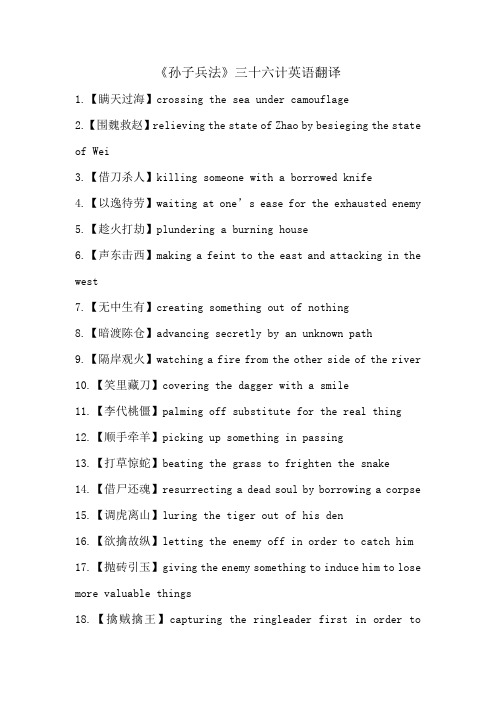
《孙子兵法》三十六计英语翻译1.【瞒天过海】crossing the sea under camouflage2.【围魏救赵】relieving the state of Zhao by besieging the state of Wei3.【借刀杀人】killing someone with a borrowed knife4.【以逸待劳】waiting at one’s ease for the exhausted enemy5.【趁火打劫】plundering a burning house6.【声东击西】making a feint to the east and attacking in the west7.【无中生有】creating something out of nothing8.【暗渡陈仓】advancing secretly by an unknown path9.【隔岸观火】watching a fire from the other side of the river10.【笑里藏刀】covering the dagger with a smile11.【李代桃僵】palming off substitute for the real thing12.【顺手牵羊】picking up something in passing13.【打草惊蛇】beating the grass to frighten the snake14.【借尸还魂】resurrecting a dead soul by borrowing a corpse15.【调虎离山】luring the tiger out of his den16.【欲擒故纵】letting the enemy off in order to catch him17.【抛砖引玉】giving the enemy something to induce him to lose more valuable things18.【擒贼擒王】capturing the ringleader first in order tocapture all the followers19.【釜底抽薪】extracting the firewood from under the cauldron20.【混水摸鱼】muddling the water to catch the fish; fishing in troubled waters21.【金蝉脱壳】slipping away by casting off a cloak; getting away like the cicada sloughing its skin22.【关门捉贼】catching the thief by closing / blocking his escape route23.【远交近攻】befriending the distant enemy while attackinga nearby enemy24.【假途伐虢】attacking the enemy by passing through a common neighbor25.【偷梁换柱】stealing the beams and pillars and replacing them with rotten timbers26.【指桑骂槐】reviling/ abusing the locust tree while pointing to the mulberry27.【假痴不癫】feigning madness without becoming insane28.【上屋抽梯】removing the ladder after the enemy has climbed up the roof29.【树上开花】putting artificial flowers on trees30.【反客为主】turning from the guest into the host31.【美人计】using seductive women to corrupt the enemy32.【空城计】presenting a bold front to conceal unpreparedness33.【反间计】sowing discord among the enemy34.【苦肉计】deceiving the enemy by torturing one’s own man35.【连环计】coordinating one stratagem with another36.【走为上计】decamping being the best。
三十六计的英语
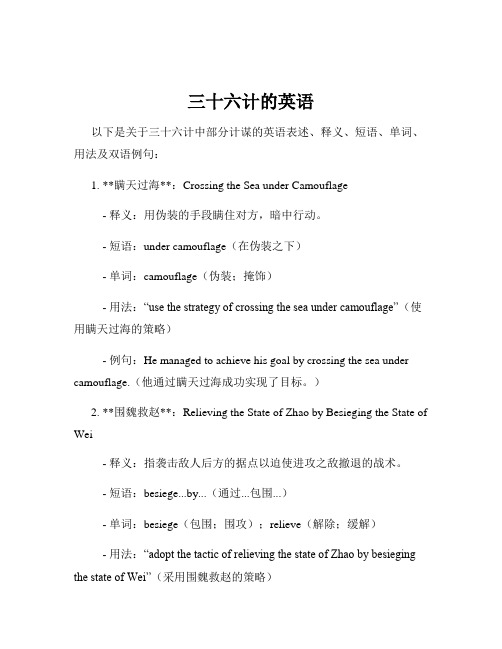
三十六计的英语以下是关于三十六计中部分计谋的英语表述、释义、短语、单词、用法及双语例句:1. **瞒天过海**:Crossing the Sea under Camouflage- 释义:用伪装的手段瞒住对方,暗中行动。
- 短语:under camouflage(在伪装之下)- 单词:camouflage(伪装;掩饰)- 用法:“use the strategy of crossing the sea under camouflage”(使用瞒天过海的策略)- 例句:He managed to achieve his goal by crossing the sea under camouflage.(他通过瞒天过海成功实现了目标。
)2. **围魏救赵**:Relieving the State of Zhao by Besieging the State of Wei- 释义:指袭击敌人后方的据点以迫使进攻之敌撤退的战术。
- 短语:besiege...by...(通过...包围...)- 单词:besiege(包围;围攻);relieve(解除;缓解)- 用法:“adopt the tactic of relieving the state of Zhao by besieging the state of Wei”(采用围魏救赵的策略)- 例句:The general decided to relieve the besieged city by besieging the enemy's base. (将军决定通过围魏救赵来解救被围困的城市。
)3. **借刀杀人**:Killing Someone with a Borrowed Knife- 释义:比喻自己不出面,借别人的手去害人。
- 短语:borrowed knife(借来的刀)- 单词:borrow(借;借入)- 用法:“employ the strategy of killing someone with a borrowed knife”(运用借刀杀人的策略)- 例句:He achieved his purpose by killing someone with a borrowed knife. (他借刀杀人达到了自己的目的。
英语版三十六计
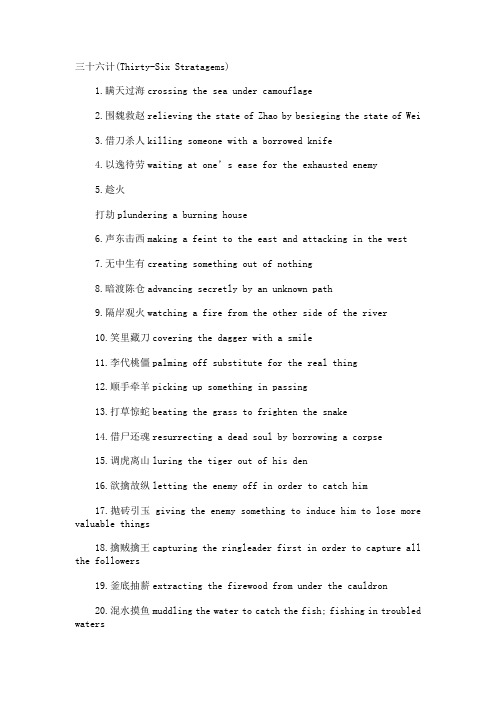
三十六计(Thirty-Six Stratagems)1.瞒天过海crossing the sea under camouflage2.围魏救赵relieving the state of Zhao by besieging the state of Wei3.借刀杀人killing someone with a borrowed knife4.以逸待劳waiting at one’s ease for the exhausted enemy5.趁火打劫plundering a burning house6.声东击西making a feint to the east and attacking in the west7.无中生有creating something out of nothing8.暗渡陈仓advancing secretly by an unknown path9.隔岸观火watching a fire from the other side of the river10.笑里藏刀covering the dagger with a smile11.李代桃僵palming off substitute for the real thing12.顺手牵羊picking up something in passing13.打草惊蛇beating the grass to frighten the snake14.借尸还魂resurrecting a dead soul by borrowing a corpse15.调虎离山luring the tiger out of his den16.欲擒故纵letting the enemy off in order to catch him17.抛砖引玉giving the enemy something to induce him to lose more valuable things18.擒贼擒王capturing the ringleader first in order to capture all the followers19.釜底抽薪extracting the firewood from under the cauldron20.混水摸鱼muddling the water to catch the fish; fishing in troubled waters21.金蝉脱壳slipping away by casting off a cloak; getting away like the cicada sloughing its skin22.关门捉贼catching the thief by closing / blocking his escape route23.远交近攻befriending the distant enemy while attacking a nearby enemy24.假途伐虢attacking the enemy by passing through a common neighbor25.偷梁换柱stealing the beams and pillars and replacing them with rotten timbers26.指桑骂槐reviling/ abusing the locust tree while pointing to the mulberry27.假痴不癫feigning madness without becoming insane28.上屋抽梯removing the ladder after the enemy has climbed up the roof29.树上开花putting artificial flowers on trees30.反客为主turning from the guest into the host31.美人计using seductive women to corrupt the enemy32.空城计presenting a bold front to conceal unpreparedness33.反间计sowing discord among the enemy34.苦肉计deceiving the enemy by torturing one’s own man35.连环计coordinating one stratagem with another36.走为上策decamping being the best; running away as the best choice。
六级英语考试翻译习题及参考翻译.doc
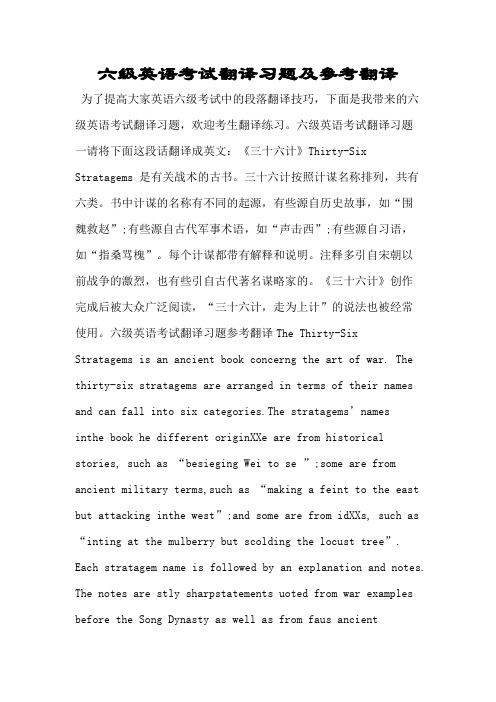
六级英语考试翻译习题及参考翻译为了提高大家英语六级考试中的段落翻译技巧,下面是我带来的六级英语考试翻译习题,欢迎考生翻译练习。
六级英语考试翻译习题一请将下面这段话翻译成英文:《三十六计》Thirty-Six Stratagems 是有关战术的古书。
三十六计按照计谋名称排列,共有六类。
书中计谋的名称有不同的起源,有些源自历史故事,如“围魏救赵”;有些源自古代军事术语,如“声击西”;有些源自习语,如“指桑骂槐”。
每个计谋都带有解释和说明。
注释多引自宋朝以前战争的激烈,也有些引自古代著名谋略家的。
《三十六计》创作完成后被大众广泛阅读,“三十六计,走为上计”的说法也被经常使用。
六级英语考试翻译习题参考翻译The Thirty-SixStratagems is an ancient book concerng the art of war. The thirty-six stratagems are arranged in terms of their names and can fall into six categories.The stratagems’namesinthe book he different originXXe are from historical stories, such as “besieging Wei to se ”;some are from ancient military terms,such as “making a feint to the east but attacking inthe west”;and some are from idXXs, such as “inting at the mulberry but scolding the locust tree”. Each stratagem name is followed by an explanation and notes. The notes are stly sharpstatements uoted from war examples before the Song Dynasty as well as from faus ancientstrategists. After the sition of the Thirty-Six Stratagems, it has been widely read in thegeneral public and the phrase “of all thirty-six stratagems, fleeing is the best” is also freuently used.1.有关战术的古书:可译为an ancient book concerng the art of war。
- 1、下载文档前请自行甄别文档内容的完整性,平台不提供额外的编辑、内容补充、找答案等附加服务。
- 2、"仅部分预览"的文档,不可在线预览部分如存在完整性等问题,可反馈申请退款(可完整预览的文档不适用该条件!)。
- 3、如文档侵犯您的权益,请联系客服反馈,我们会尽快为您处理(人工客服工作时间:9:00-18:30)。
英文三十六计
三十六计(Thirty-Six Stratagems)
1.瞒天过海crossing the sea under camouflage
2.围魏救赵relieving the state of Zhao by besieging the state of Wei
3.借刀杀人killing someone with a borrowed knife
4.以逸待劳waiting at one’s ease for the exhausted enemy
5.趁火打劫plundering a burning house
6.声东击西making a feint to the east and attacking in the west
7.无中生有creating something out of nothing
8.暗渡陈仓advancing secretly by an unknown path
9.隔岸观火watching a fire from the other side of the river
10.笑里藏刀covering the dagger with a smile
11.李代桃僵palming off substitute for the real thing
12.顺手牵羊picking up something in passing
13.打草惊蛇beating the grass to frighten the snake
14.借尸还魂resurrecting a dead soul by borrowing a corpse
15.调虎离山luring the tiger out of his den
16.欲擒故纵letting the enemy off in order to catch him
17.抛砖引玉giving the enemy something to induce him to lose more valuable things
18.擒贼擒王capturing the ringleader first in order to capture all the followers
19.釜底抽薪extracting the firewood from under the cauldron
20.混水摸鱼muddling the water to catch the fish; fishing in troubled waters
21.金蝉脱壳slipping away by casting off a cloak; getting away like the cicada sloughing its skin
22.关门捉贼catching the thief by closing / blocking his escape route
23.远交近攻befriending the distant enemy while attacking a nearby enemy
24.假途伐虢attacking the enemy by passing through a common neighbor
25.偷梁换柱stealing the beams and pillars and replacing them with rotten timbers
26.指桑骂槐reviling/ abusing the locust tree while pointing to the mulberry
27.假痴不癫feigning madness without becoming insane
28.上屋抽梯removing the ladder after the enemy has climbed up the roof
29.树上开花putting artificial flowers on trees
30.反客为主turning from the guest into the host
31.美人计using seductive women to corrupt the enemy
32.空城计presenting a bold front to conceal unpreparedness
33.反间计sowing discord among the enemy
34.苦肉计deceiving the enemy by torturing one’s own man
35.连环计coordinating one stratagem with another
36.走为上decamping being the best; running away as the best choice。
